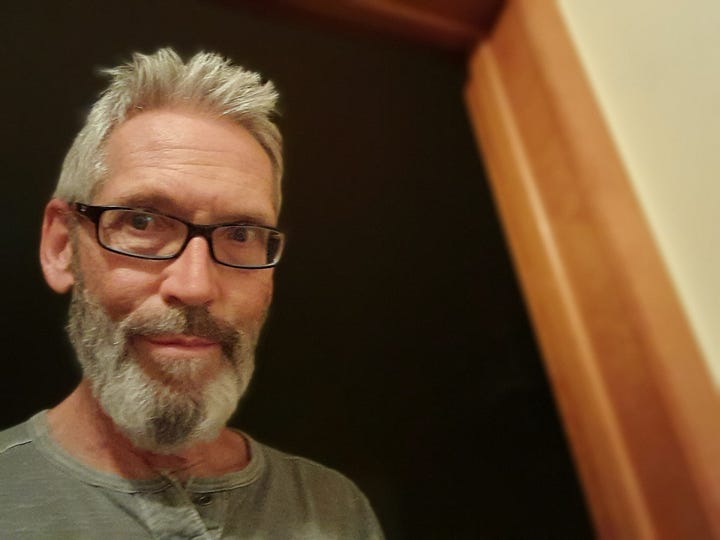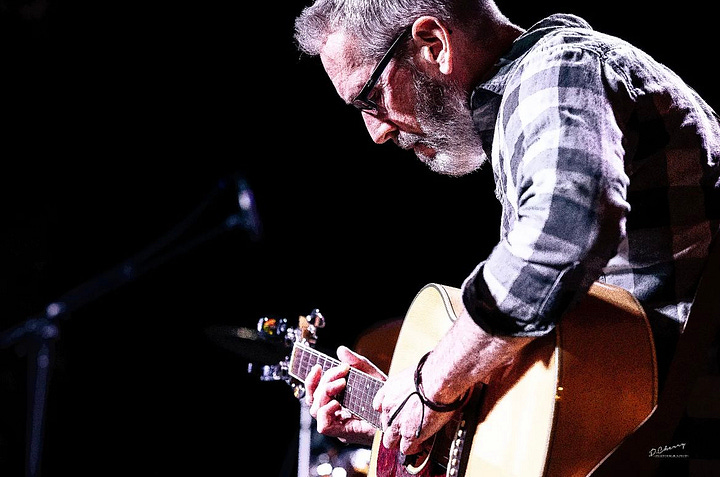I'd Give My Left Kidney...My "Good Art Friend" Dave Ramont: Musician, Writer, & Voluntary Kidney Donor
Also, novelist and indie publisher James Reich on what helps sell books (& 3 new recommendations)
Agent List XI will be out in a couple of days. The most recent agent list can be accessed here (these lists are only accessible with a monthly or annual subscription, but most other Bookish posts are free).
Before today’s interview with the great Dave Ramont, a quick publishing-related detour:
I asked James Reich, founding editor and EiC of Stalking Horse Press (and author most recently The Moth for the Star), what he’s observed (in addition to a big marketing campaign paid for by a publisher, along with hand-selling and word-of-mouth) helps to sell a book. James’ thoughts:
The design certainly matters, from thinking about how most people might only see a thumbnail image of a book's front cover online to making sure you have beautiful typesetting. It shows that, even though you might not be so well-known, your publisher believes in your prose enough to care how it is perceived as a print object. As an author, your words are often all you have, and they deserve a little gravitas and a thoughtful design setting on the publisher's part.
(James also writes The Ecological Uncanny here on Substack.)
*
It was back in the (marginally) innocent year of 2000 that I met Dave Ramont at a mutual friend’s show at the Empty Bottle in Chicago (I think this was where it was—the fog of the past is ever-thickening.)
I can’t say enough good things about Dave as a musician and a friend. He’s a committed advocate and helpmate of other creators, whether they’re musicians, hapless fiction writers, erstwhile spice-grinders, or strangers in need of a kidney (when he told me last month he’d donated a kidney to a man he’d never met, telling no one until a day or two before the extraction, which he shares more information about below, I thought, “Wow, this is almost the opposite of the story Robert Kolker told in his NYT feature ‘Who Is the Bad Art Friend?’ a couple of years ago”).
Dave resides in St. Charles, IL but takes to the road for fresh air and new vistas when time and resources permit. A recent trek had him camping in Colorado and other points west. Along with solo work, Dave collaborates and performs with a coterie of other gifted writer-musicians, among them Dave Sills, Scott Stevenson, Chris Walke, Noah Gabriel, Bob Kuhn, Dave Nelson, and Funktional Family. He and Gerald Dowd, whose new album Father’s Day is out (and is really damn good!), often collaborate too.
Christine/Bookish: You've been writing songs and playing solo and with other musicians since you were a teenager. I think you once told me your first band's name was Mange. (That obviously made an impression!) Can you talk a little about your musical beginnings? Were you born into a musical family?
Dave Ramont: My mom played piano. Her grandma was a classical pianist of some renown, and although Dad didn’t play an instrument, he loved music, particularly big band stuff and the crooners. My three older siblings played piano, clarinet, etc. and we were spinning 45s & LPs constantly. My original grade school purchases were Cat Stevens, Simon & Garfunkel, Neil Young, and the Guess Who. I was addicted to top 40 radio, memorizing the weekly reports you could grab at the record store that showed the Top 40 order, artists, and their record labels.
In recent years I’ve reflected on how the songs that affected me most profoundly in those formative years were the extremely melancholy ones. I discovered Bob Dylan by checking out cassettes from the library—a major revelation as far as lyrics go—while simultaneously immersing myself in typical early teen testosterone stuff: Led Zeppelin, Aerosmith, Black Sabbath, before I progressed to Pink Floyd, Jethro Tull, Grateful Dead, etc.
After high school I discovered singer/songwriters like John Prine and Loudon Wainwright. I started guitar lessons in 6th grade, and by 8th grade, we’d formed the Nasty Habits Band—named from a Rolling Stones song—playing at high school parties and dances though we were younger than our audience. And yes, that morphed into The Mange. Ha! Our parents must’ve been very proud!
CS: You've released three solo albums: Taw, Scrawny, and Scofflaws, as well as three albums with your nutball, genius band Dick Smith: Swill, Woozy, and Smoke Damage (stellar albums to the one—check them out here). How would you describe your musical style?
DR: I actually have four solo records, but my first (Toaster Reflection), I don’t advertise anymore, though a few of those songs still rear their heads. There are personally cringe-worthy moments there, where the writing is a bit too...obvious. Revealing. We learn these lessons and (hopefully) tweak the craft, cloak the sentiments. Let the listener decide what the song is about.
Stylistically, these days the industry labels it Americana. I’d say at the heart of it, it’s the singer/songwriter ethos I was raised on, with bits of pop, folk/country, and rock all in the stew. The Dick Smith output reflects more of the country and bluegrass leanings, seeping out of the old school Hank Williams and Johnny Cash songbooks blended with the 90s insurgent/alternative country movement—bands like the Gourds and the Bad Livers from Austin. To me, the songwriting legacy of Jimmy Smith and Kevin Russell from the Gourds rivals the brilliant catalog of Lennon & McCartney.
I’m a lyric guy; if I can read a song lyric without the music playing and be moved or affected by it, I’m all in. Of course, the music is critical as it’s the thing that originally draws us in, so it’s that perfect combination. A guy like Tom Waits, to me his songs are like little movies—evoking these feelings—and he’s the star of each movie. He taught me the use of nouns in songs, painting pictures.
Other faves include Joe Henry, Jim White, Gillian Welch, Peter Case. Storytellers. That being said, I love great pop music—it’s a whole other process—and many songs that hit you musically, you might have no clue what they’re even saying.
CS: How do you balance songwriting, performing and your day jobs as magazine writer and occasional landscaper dynamo?
DR: The million-dollar question! I balance them...poorly. In that the writing has always been last in line, even if it’s first in mind. I know you’ve struggled with this balance, as others in the arts-for-commerce biz have forever; we gotta eat. I’ve worked many grunt jobs to pay bills, as well as teaching music, i.e. private lessons, for many years. Turned down advancement opportunities as I figured that’d derail the music dreams.
I wish I’d been more disciplined about exercising the writing muscle regularly, instead of being more focused on the day-to-day grind of survival. The balance. Giving your creative self a fighting chance. I saw Nick Cave last week—he’s touring— and he mentioned how he gets up in the morning, puts a suit on, kisses his wife goodbye and goes into a room in his house with a piano and desk and works on writing all day. The great songwriter Richard Thompson does the same—keeps an office and regular office hours. Of course they’ve crossed the threshold [financially] to have this opportunity.
You mentioned in a recent Bookish post about being dispirited. It’s hard not to be! Much effort and sacrifice but the rewards are scant. I’m well overdue for a new record—I have songs piled up, new seeds, but it’s daunting—making records independently is expensive.
That being said, I’m currently poring over song snippets I’ve recorded, and flipping through notebooks and scraps of paper with words and ideas, to get in this winter and start recording. In that recent post you also wondered: If you were told that you’d never publish another word would you keep writing? It’s a common conundrum, but I answer with a resounding yes! It’s what we got. The blues guys in the 1920s & 30s—they never considered making a living from their songs, not to mention generations of poets, painters and writers before them. So we plow on.
And at songwriting workshops I always suggest the same thing: only try to please yourself. The goal is to still want to sing that song in 5 or 20 years—don’t assume anyone else will care about it.
I’d see stories on the news about kidney donation and think, “I have two, why shouldn’t I do that?” There are 100,000 people on the kidney wait list, and thousands die every year while waiting. Yet only around 300 people a year participate in non-directed donation.
CS: When I saw you recently, you told me something extraordinary—you decided to donate kidney to a stranger (and didn't tell anyone until just before the extraction). What spurred you to make this unbelievably generous act and how do people find out more about organ donation?


DR: That’s kind of you. I’ll just say I’ve been very fortunate in life as far as my health, even with all the punishment I’ve put upon my body. And I’d see stories on the news about kidney donation and think, “I have two, why shouldn’t I do that?” There are 100,000 people on the kidney wait list, and thousands die every year while waiting. Yet only around 300 people a year participate in non-directed donation, where you don’t have a recipient in mind.
Therefore, this often sparks a “kidney chain,” since your kidney could go anywhere. So if someone wants to donate to a loved one but they’re not a match, they sign up to donate, and then when their loved one does get a match, they donate to someone else. This can involve several people or more. My recipient is doing great, and indeed, his wife then donated to another woman, who’s also doing well.
I can report that nothing physically has changed for me at all—no lifestyle changes. It was the most uplifting thing I’d ever been part of. For those curious—I met someone who also gave altruistically, Laurie Lee, who is a dynamo dedicated to educating on the donation process. Her podcast is touching and informative, a great introduction. You can find episodes at: donordiaries.com
Another guy I dealt with, Ned, he founded the National Kidney Donor Organization (NKDO) after giving, and it’s a helpful place to start the journey: nkdo.org
And the National Kidney Registry (NKR) works to match donors and recipients and make those chains.
Dave’s upcoming shows:
10/14: Roaring Table Brewery, Lake Zurich, IL, 7:00 PM CT
10/18: Preservation, Geneva IL, 6:00 PM CT
10/21: Craft Urban, Geneva, IL, 8:30(?)PM CT
10/28: Sidecar, Batavia, IL, 9:00 PM CT
11/1: Moonlight Theatre, Songs Illuminated series, St. Charles, IL, 7:00 PM CT
Recommendations!
1. If you’re looking for script consulting and proofreading—I have one more suggestion: Roxanne Raye is a writer, script editor and proofreader based in LA. Her MFA in screenwriting is from UCLA, where she received a Humanitas Drama Fellowship nomination and the Oliver's Prize for Best Animated or Family Film. Her credits include "Miss Famous" starring Kristen Wiig (streaming on Amazon Prime). Contact: roxannebeck1@gmail.com.
2. & 3. On my to-be-read list: Edra Ziesk’s novel The Trespasser and Michael Antman’s novel Everything Solid Has a Shadow




